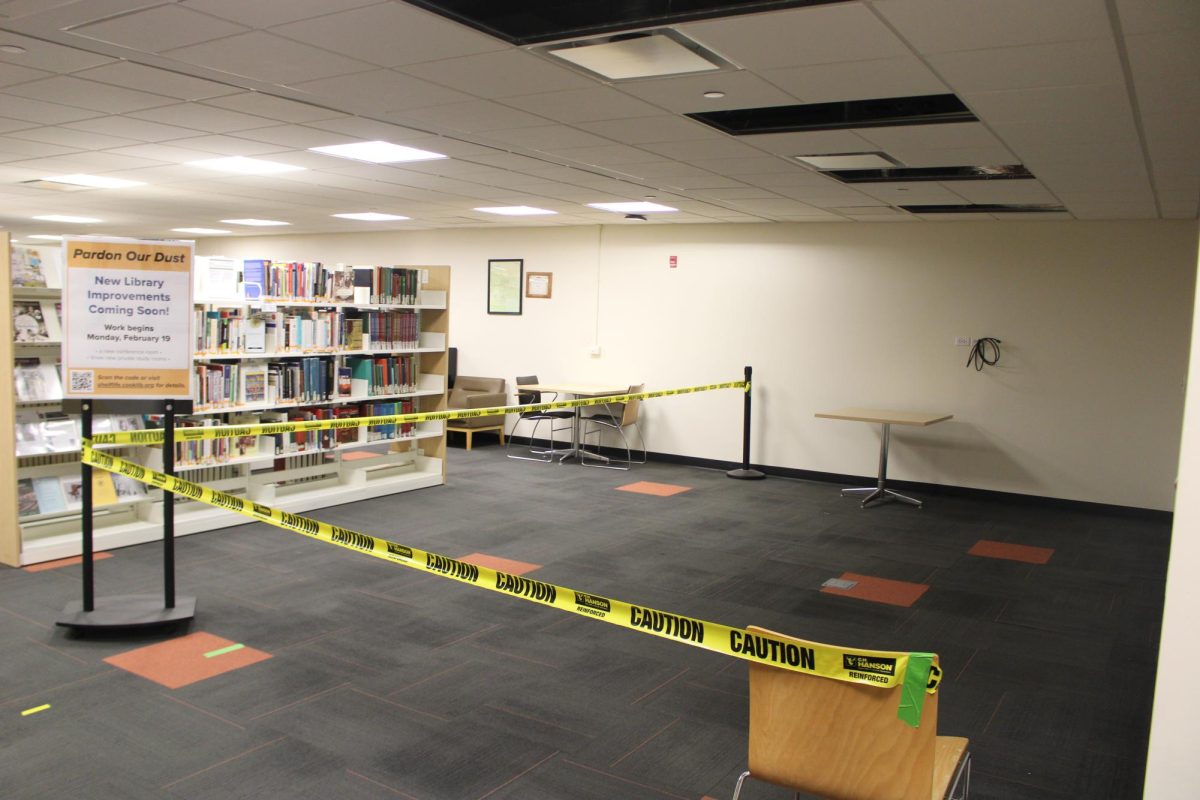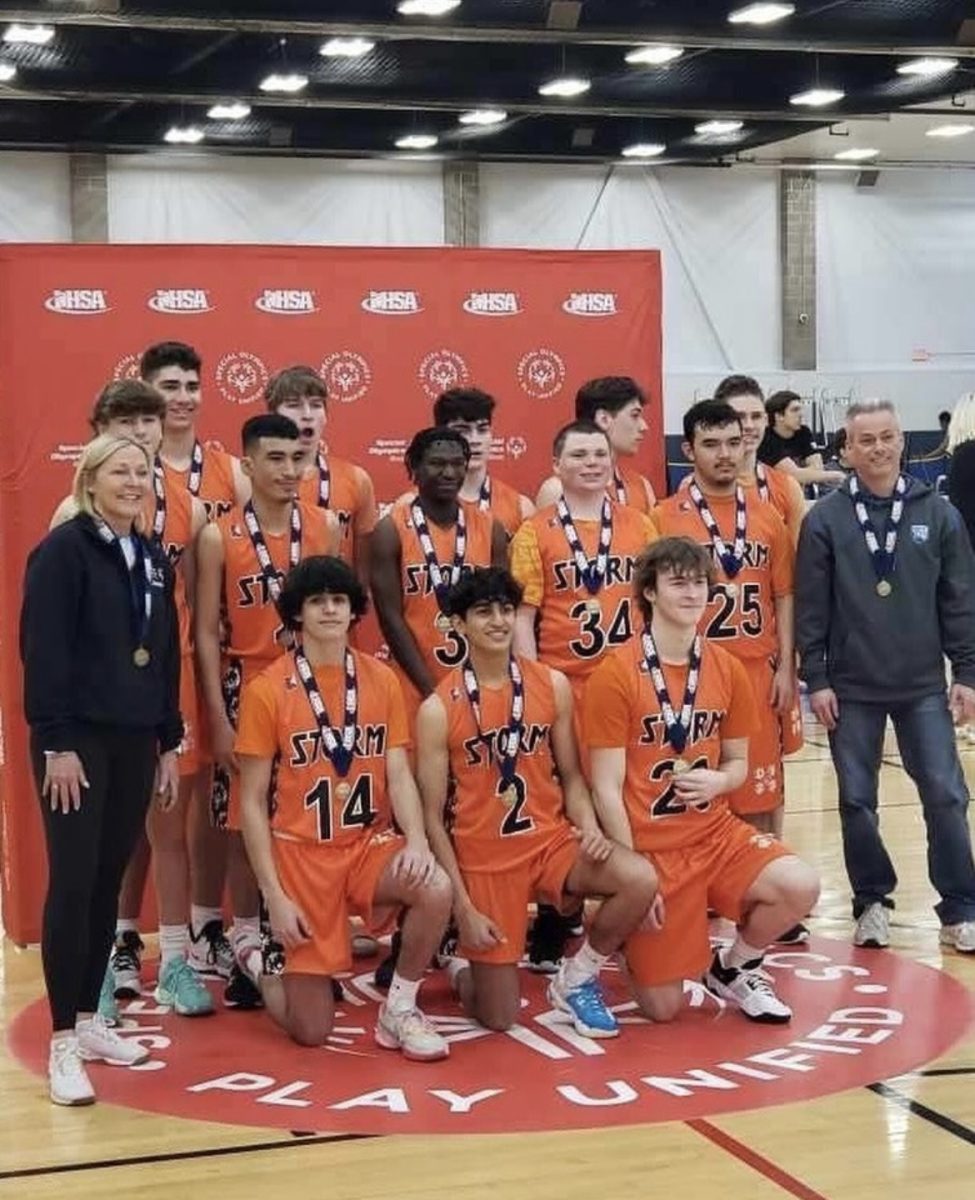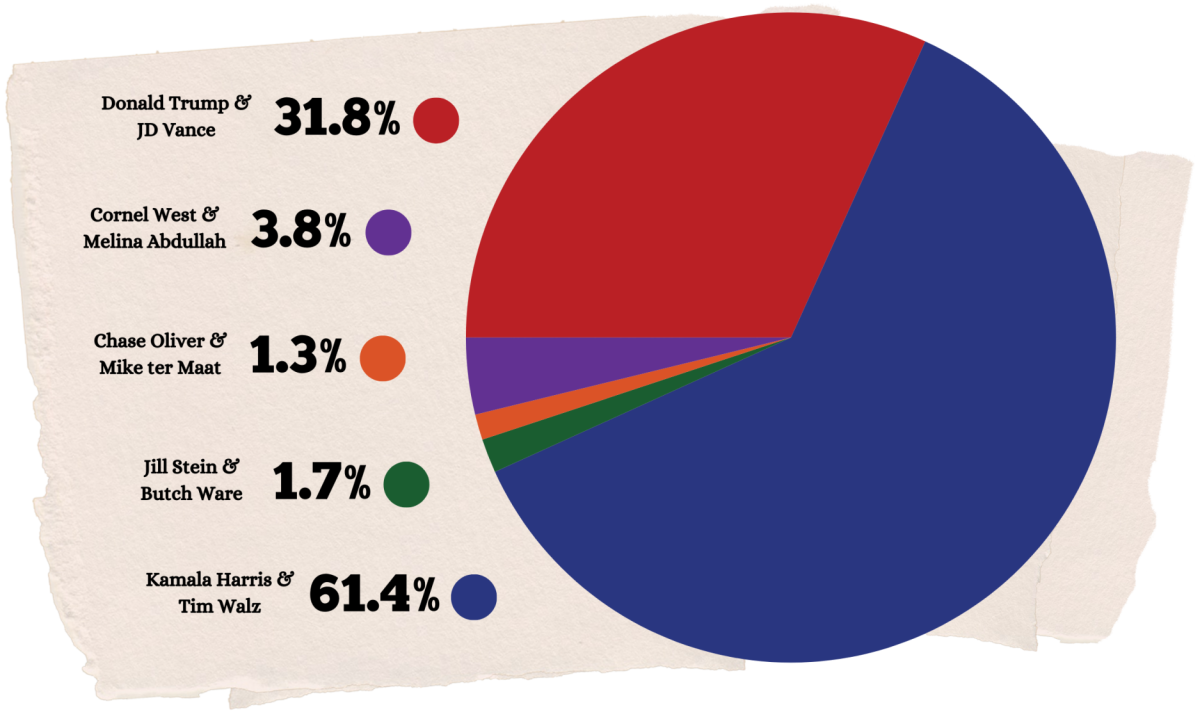New Policies
It’s no secret to students and staff members that LHS has placed a tighter hold on its hallway and cell phone practices for the 2023-24 school year. Mandatory hall and bathroom passes, “cell phone hotels” and hall monitors are now an integral part of every school day.
“[These practices] are a recalibration for us from COVID times as we continue to evolve back to “in-person” [learning], said Assistant Principal Dr. Albin. “We have not changed our practices but made sure people are more aware of them in the hallways.”
The D128 School Board approves and determines the policies that the schools carry out.
“We’re looking out for the overall best interest of the school,” said Security Supervisor Mr. Uliks, “so we appreciate everybody just abiding by the rules. [It] makes everybody’s jobs easier.”
“While these practices might seem to be a ‘shock’ to students this year, this is a result of “let[ting] some of the [pre-COVID] structure go so we’re trying to put [some of the previous] structure back in,” Dr. Brown said. “It keeps [students] more accountable for what they’re doing [in the halls].”
Hall Passes
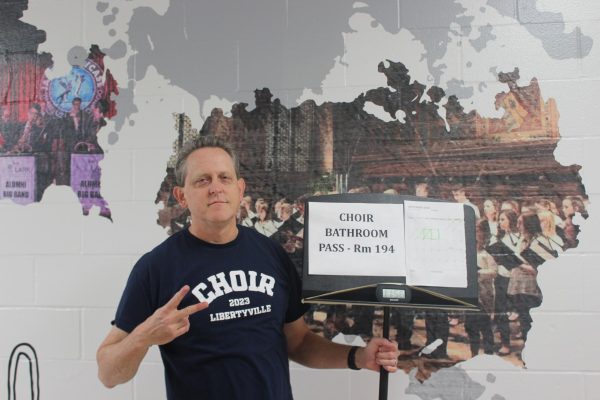
When it comes to the practices themselves, teachers have a choice for how they want to instate them in their classrooms.
“I just use the traditional school passes that they gave us,” English teacher Ms. LeMaistre said, referring to the default pink passes that are distributed to the staff.
Other teachers choose to have some fun with the items they use. Choir teacher Dr. Brown has provided his students with a less conventional bathroom pass, a music stand.
Dr. Brown asked his seniors: “‘Hey, guys, gotta have a bathroom pass… What should we do for choir?’” One senior shared their idea, and the music stand bathroom pass evolved from there.
“However, there are students that don’t feel comfortable carrying this around,” Dr. Brown added. “So I just write them [a traditional pass].”
A music stand is not the only creative type of pass entering the hallways.
“Originally, we were [using] a little skeleton… we try to have fun with it,” Sports Medicine teacher Ms. Franchi said.
Whether they use a school-provided pass or create their own, teachers are almost unanimous in the effects this has had in their classrooms.
“For safety reasons, I have always felt that my students are my responsibility,” English teacher Ms. Tarczynski said. “So as far as hall passes go, you have to know where a student’s going to be at all times.”
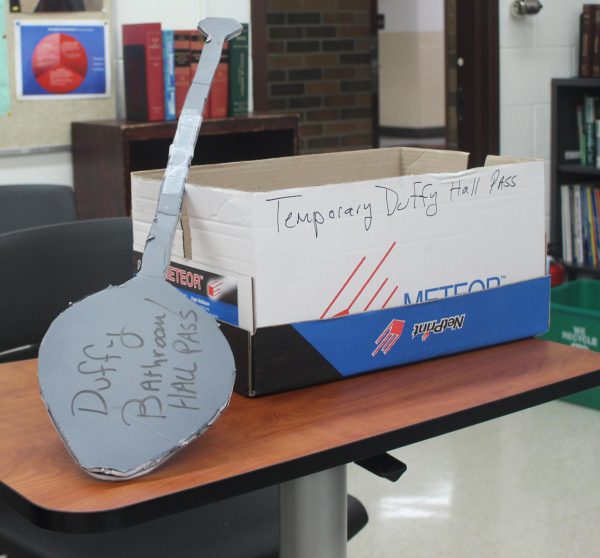
cardboard box that social studies teacher Mr.
Duffy uses for hall passes are on display.
One of the reasons why teachers chose to make
their own hall passes was to make it more
convenient for teachers to see if a student
has a pass or not. (Jordan Lui)
The passes provide a better environment in the classroom as well.
“We’ve cut down on class tardiness and truancies already,” Mr. Uliks stated. “[Additionally,] we’ve received less complaints from teachers and other people about distracting noise in the hallway.”
While students have been mostly compliant with the potentially unfamiliar routines, some concerns have arisen.
“I think with the bathroom passes, I’m [concerned] about the germs and cleanliness,” sophomore Ava Graditor explained. “It is a risk for higher sickness between people. I feel like if it was just a paper pass that was handed to you and you throw it away after, it’d be fine. I just feel like the one that people carry back and forth, especially if it’s not sanitized, is not the cleanest.”
Cell Phone Regulations
Similar to hallway passes, cellphones regulations have also played a role in providing an effective learning environment. The distractions caused by cellphones are not reserved solely for students.
The distraction of the cellphone is universal. “[I] know from my own experience, that if somebody texts me and it’s in my pocket, and the [notification] buzz goes off, I want to know who’s texting me,” Ms. Tarczynski said.
Ms. Franchi has also noticed that the introduction of “cellphone hotels” in her classroom has allowed “students to actually engage in learning and provide insights rather than be distracted by their phones.”
Cellphone hotels are temporary holders for cellphones during class time, such as pocket charts, charging stations, or simply a box with dividers. Students drop off or plug in their cellphones at the start of the period and retrieve them after class ends.
Some students have acknowledged the difficulty of avoiding the constant diversion of screens in classes.
“I think the phone hotels are a smart idea because last year in a lot of my classes, I saw people with their phones out, not paying attention, and that later affected their grades, “ said Graditor. “I feel like it’s smart to take away the distraction that we [already] have in our everyday lives.”
The removal of phones in some classes is evidently building habits, to the point where some teachers are choosing to only confiscate phones if they become an issue. Ms. LeMaistre, for one, doesn’t utilize a “cell phone hotel.”
“There are different reasons why I think that could be good in my classroom or not,” she said. “So far, I’ve just made it very clear that [student’s phones] should be put away in their backpacks, and I feel like almost all of my students respect that.”
While potentially new to the students, many teachers at LHS remember these practices being implemented before COVID-19.
“I’ve worked at the school for 20 years and we would always write passes,” Dr. Brown said.
The school plans to continue the current rules, as they have aided to a strong start to the school year and help set a precedent of responsibility for students.
“Our students are getting into class and realizing what their high school responsibilities are,” Dr. Albin concluded. “We get an influx of new students every year and we have to acclimate them to the freedom and autonomy [that is what the] expectation will be beyond these walls.”






